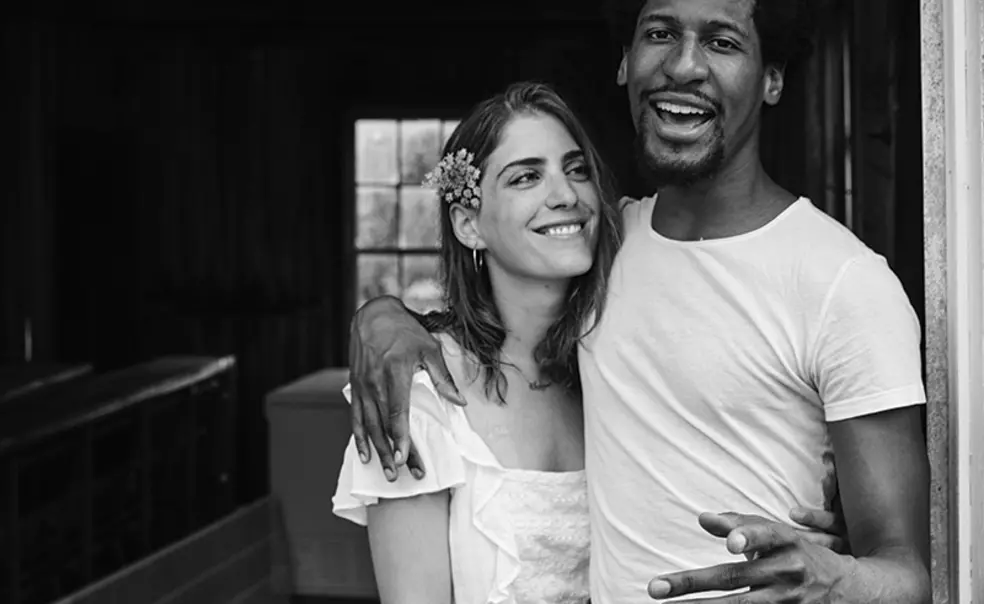Suleika Jaouad ’10 and Jon Batiste Will Perform at Princeton
‘The Beat Goes On’ is the newest installment of the Princeton University Concerts Healing with Music series
Writer Suleika Jaouad ’10 was diagnosed with leukemia a year after graduating from Princeton. During her time in the oncology ward at Mount Sinai Hospital in New York City, Jon Batiste, her friend from band camp at age 13, learned about her illness and surprised Jaouad with his entire band, which played an impromptu concert in her hospital room.
“I remember just being so struck by the fact that hospitals are musicless places. There’s lots of sound and noise: There’s the beeping of IV poles, there’s the wheezing of respirators, there are the alarms that go off whenever someone is in critical condition,” Jaouad told PAW. “To have that noise be replaced by music had such a powerful effect that day. It transformed the space of sadness and suffering into something full of catharsis and joy.”
Now married, Jaouad and Batiste are constant collaborators. Jaouad listens to every draft of his songs; he is often her first reader. Their most recent collaboration is the documentary American Symphony, which follows the composition of Batiste’s four-movement eponymous symphony alongside the return of Jaouad’s leukemia in 2021.
On Nov. 15, the couple will explore Jaouad’s experiences with leukemia and isolation in a performance at Princeton called “The Beat Goes On: Healing from Cancer Through Music” — the newest installment of the Princeton University Concerts (PUC) Healing with Music series.
“I feel really excited about the idea of sharing Princeton with Jon and being able to collaborate together in this way, because it’s so in line with what we’ve been living and breathing and practicing for the last year and a half,” Jaouad said.
Healing with Music was developed by PUC director Marna Seltzer and outreach manager Dasha Koltunyuk ’15, who wanted to rethink how PUC did concerts — how they did everything — when programming returned to Richardson Auditorium in the fall of 2021 after a pandemic hiatus.
The impetus for the series, Seltzer told PAW, was “a recognition that everybody was doing some form of healing, for whatever reason, and that was something that we shared way more than we did pre-pandemic.”
In an innovative “concert-conversation” format, artists share their relationships with healing and music’s role in that journey through a combination of live performance and dialogue. Last year’s PUC season featured three Healing with Music performances.
Finding artists for this kind of series requires sensitivity. The PUC team went beyond the traditional conversations with agents and managers and asked about artists who had experienced some kind of illness and were interested in sharing their personal stories.
“There are a lot of questions around who wants to talk about those things, and there’s a certain amount of courage that is required for someone to step up and speak,” Seltzer said.
Joshua Roman, a cellist and November 2022 Healing with Music artist, opened up on stage about developing long COVID and symptoms like dysautonomia, a disorder affecting the autonomic nervous system. During the pandemic, he had been questioning his relationship with the cello and performing.
“[PUC] asked me, first, if I would be comfortable sharing my condition at all,” Roman said. “It’s a big deal for me to walk on stage and say, ‘I have a condition which affects my cognitive and physical abilities.’”
In a case like Roman’s, Seltzer explained, disclosing the condition could affect his ability to book future performances. But the courage and vulnerability of speaking about illness, particularly alongside the music that has been so critical for each artist’s healing, creates opportunities for connection that can be completely transformative — for both audience and artist.
“Because I’m used to going up on stage and being a presenter, a performer, a perfectionist, to instead walk up on stage and literally talk about what feel, in many ways, like deficiencies, felt important,” Roman said.
Roman’s experience at Princeton directly inspired his new project, Immunity, which he will be workshopping in his new position as a creative associate at Juilliard.
This year, while the format of the Healing With Music events will mostly remain the same — a short video profile of the artist, released to audiences beforehand, and a conversation with live music — PUC will enrich each experience with community partnerships and programming.
In addition to Jaouad and Batiste, the series also includes a March 3 conversation with David Leventhal, the founder of Dance for Parkinson’s Disease (Dance for PD), and Princeton faculty experts about the intersection of dance, healing, and music, followed by a performance by dancers from local Dance for PD chapters. The American Repertory Ballet will offer free Dance for PD classes leading up to the event.
On April 24, pianist Jonathan Biss will perform and join writer Adam Haslett for a discussion of anxiety, depression, and music. The Princeton Public Library will host book clubs around each performance, starting with Jaouad’s Between Two Kingdoms: A Memoir of a Life Interrupted in early November.
Looking forward, Seltzer hopes to expand Healing with Music into more forms of healing, including racial and political healing.
“Our goal with all of our events has always been to create ways for people to make their own personally relevant connections to what we’re doing,” Seltzer said. “We’re seeing people come into the concert hall for different reasons other than just going to a concert.”
Editor’s note: This story was updated to note Dasha Koltunyuk ’15’s contributions to the Healing with Music series.












No responses yet